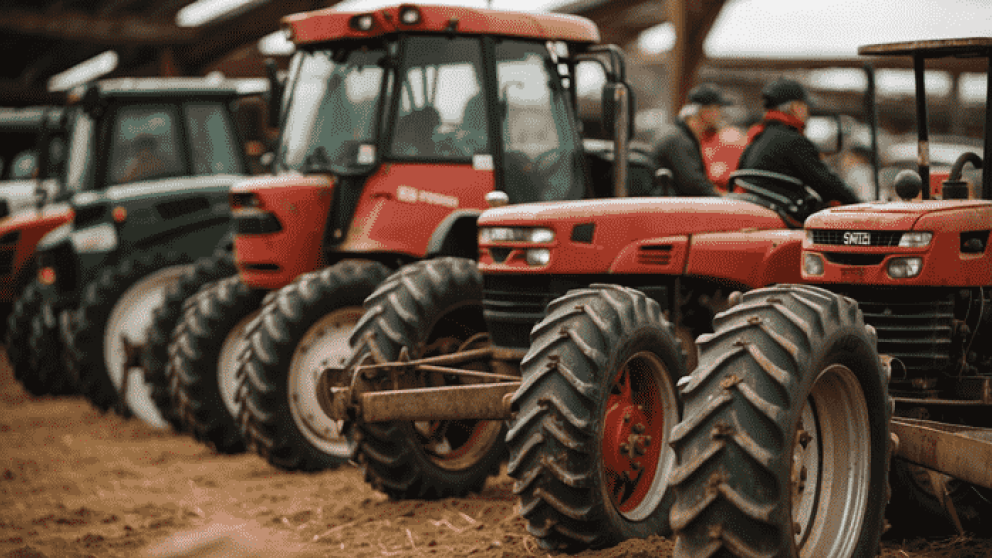7 Common Mistakes to Avoid at Farm Auctions

Farm auctions provide a way to buy and sell agricultural equipment and land. These events can be exciting and full of opportunity. But they also come with risks for buyers and sellers if you need to prepare.
Knowing what mistakes to avoid can make a big difference at farm auctions. Awareness of common pitfalls helps bidders make smart choices and get good deals.
With the right approach, farm auctions can be a great way to find quality equipment or sell farmland for a fair price.
1) Not Researching Market Prices

Farm auctions can be exciting events, but they also require careful preparation. One of the biggest mistakes buyers make is not researching market prices beforehand.
Knowing the value of the equipment is crucial. Buyers can avoid overpaying or missing out on good deals with this knowledge. Researching competitive prices helps set realistic expectations.
There are several ways to research prices. Online marketplaces, dealer websites, and recent auction results can provide valuable information. Trade publications and industry reports also offer insights into current market trends.
When comparing prices, it's important to consider the condition of the equipment. A well-maintained machine may command a higher price than a similar model in poor condition.
Seasonal factors can also affect prices. Demand for certain equipment may increase during specific times of the year, impacting auction prices.
2) Overbidding in the Heat of the Moment

Farm auctions can be exciting events. Energy and competition can cause bidders to lose sight of their budget limits.
Overbidding is a common mistake at auctions. It happens when emotions take over and rational thinking goes out the window.
Bidders may get caught up in the thrill of winning. They might keep raising their bids even after passing their preset limit.
This can lead to paying more than an item is worth or to spending beyond one's means.
Bidders should set a firm maximum bid before the auction to avoid this. They need to stick to this limit no matter what happens during bidding.
It's important to stay calm and collected. Taking deep breaths and pausing before each bid can help maintain control.
Remembering that there will always be other auctions can also help. If an item goes beyond the budget, it's best to let it go.
Emotional bidding can be costly. By staying level-headed, bidders can make smarter decisions and avoid overpaying at farm auctions.
3) Ignoring the Auctioneer's Instructions
Auctioneers play a key role in farm auctions. They provide important information and set the bidding rules. Paying attention to their instructions is crucial for a smooth auction process.
Bidders should focus on the auction and avoid distractions. Using phones or talking during the event can be disruptive and disrespectful, and it may cause bidders to miss important details or bidding opportunities.
Auctioneers often explain bidding increments, lot numbers, and any special conditions. Ignoring these details can lead to confusion or mistakes in bidding. Bidders might accidentally bid on the wrong item or need to understand the current price.
It's also important to follow the auctioneer's pace. Some bidders try to speed up or slow down the process, which can frustrate other participants and the auctioneer. It's best to stick to the established rhythm of the auction.
Auctioneers may give instructions about payment methods or pickup procedures. Not listening to these details can cause problems after winning a bid. Bidders might face unexpected fees or miss important deadlines for item removal.
4) Buying Livestock without Inspection
Experienced farmers know the importance of inspecting animals before buying them at auctions. Skipping this step can lead to costly mistakes.
Livestock auctions often allow buyers to inspect animals before bidding starts. This will enable buyers to check the animals' health and condition up close.
When inspecting livestock, look for signs of illness or injury. Check the animals' eyes, coats, and overall body condition. Pay attention to how they move and behave.
Ask questions about the animals' history, including vaccinations and any treatments they've received. If available, request veterinary records.
Observing the auction process can also be helpful. This allows buyers to familiarize themselves with how things work and make more informed decisions.
If you're new to auctions, consider bringing an experienced farmer or veterinarian. They can offer valuable insights and help you avoid purchasing unhealthy animals.
Remember, buying livestock without proper inspection is risky. It's better to be patient and thorough than to rush into a purchase you might regret later.
5) Failing to Set a Budget
Setting a budget is a key step when attending farm auctions. Many buyers do not have a clear spending limit in mind. This can lead to overspending or missing out on good deals.
Before the auction, it's important to research the value of items you're interested in. Look at recent sale prices for similar equipment or land. This will help you set realistic budget limits for each item.
Setting a budget allows buyers to make informed decisions during the fast-paced auction process. It helps prevent impulse buys or getting caught up in bidding wars.
Buyers should also consider additional costs like taxes, transportation, and repairs. These extras can quickly add up and push spending over budget if not accounted for.
Setting an overall budget and individual limits for specific items is wise. This strategy helps buyers prioritize their purchases and avoid overspending on less important items.
Sticking to a pre-set budget takes discipline, especially during an auction's excitement. But it's crucial to make smart financial decisions and avoid buyer's remorse later.
6) Not Understanding Auction Terms
Farm auctions have their unique language. Not knowing these terms can lead to costly mistakes for buyers.
One important term is "reserve price." This is the lowest price the seller will accept. If bids don't reach this amount, the item won't sell.
"As is, where is" means the buyer accepts the item in its current condition. No guarantees or returns are allowed.
Livestock auctioneers often speak very fast, and their rapid-fire style can confuse new buyers. It's crucial to listen carefully and understand the current bid amount.
"Buyer's premium" is an extra fee for the winning bid. This goes to the auction house. Buyers need to factor this into their budget.
"Absentee bid" allows people to bid without being there in person. Knowing how to use this can be helpful if you can't attend.
Learning these terms before the auction is key. It helps buyers make smart choices and avoid surprises. Studying auction language can lead to better deals on farm equipment and land.
7) Forgetting to Factor in Transportation Costs
Farm auctions often feature large equipment and machinery. Buyers sometimes forget to consider the cost of moving these items to their farms.
Transportation expenses can be significant, especially for bulky or heavy items like tractors or combines. These costs may include hiring a specialized hauling service or renting a trailer.
Proper hauling of tractors is essential to avoid damage during transport. Failing to account for this can lead to unexpected expenses or equipment issues.
Buyers should research transportation options and costs before bidding. This helps them set accurate budgets and avoid overspending on auction items.
Some auction houses offer shipping services, but these may be expensive. To find the best deal, compare prices with independent transporters.
Buyers might consider bringing their own truck or trailer to the auction for smaller items. This can save money and allow for immediate pickup of purchased goods.
Factoring in transportation costs can help buyers make more informed decisions at farm auctions. This ensures they stay within their budgets and do not face surprise expenses after winning a bid.
The Auction Process- How Farm Auctions Work
Farm auctions have their own unique rules and terms. Learning how they work and key vocabulary will help you avoid mistakes on auction day.
Farm auctions bring together buyers and sellers of land, equipment, and livestock. An auctioneer leads the event, calling out bids and encouraging higher offers. Bidders can participate in person or online.
Most farm auctions use an open ascending bid format. The auctioneer starts with a low price and increases it as bidders show interest. The highest bidder wins the item.
Some auctions have a reserve price. This is the minimum amount the seller will accept. If no one bids that high, the item doesn't sell.
Buyers should arrive early to register and inspect items. Having a bidding strategy and maximum budget is crucial.
Key Auction Terms to Know
Bid - An offer to buy at a specific price
- Lot - A single item or group of items being sold together
- Reserve - The minimum price a seller will accept
- Hammer price - The final winning bid amount
- Buyer's premium - An extra fee added to the hammer price
It is important to research auction items beforehand. Look up fair market values for similar farms or equipment. This helps avoid overpaying.
Pay attention to the terms of the sale. These cover payment methods, removal deadlines, and guarantees on items sold.
Understanding these basics will make you a more confident bidder at farm auctions.
Making Informed Bids
Smart bidding at farm auctions requires careful item evaluation and control over emotions. These skills help buyers get good deals and avoid overpaying.
Evaluating Items Correctly
Proper item assessment is critical to intelligent bidding. Buyers should scrutinize equipment before the auction begins. Check for wear, damage, and needed repairs.
Research fair market prices for similar items. This will give you a baseline for bidding. To compare accurately, know the item's make, model, and year.
Ask questions about the item's history and condition. Most auctioneers allow time for this before bidding starts. Take notes to remember important details.
Consider hidden costs like transport and repairs. Factor these into the maximum bid price. Items that need work may not be worth as much.
Avoiding Emotional Bidding
Emotions can lead to poor choices at auctions. Stay calm and stick to a preset budget for each item. Don't get caught up in bidding wars.
Avoid distractions during the auction. Focus on the bidding process. Talking or phone use can cause missed bids or hasty decisions.
Wait before bidding. Experienced bidders often hold back at first. This can reveal the true interest level and avoid driving up prices early.
If an item goes above your max price, let it go. There will be other chances. Patience often leads to better deals at auctions.
Your Dream Farm Is Just a Bid Away—Lock It in with Our App
Don’t let the perfect farm slip through your fingers. At Underwood Land Company, we bring you the best farm properties available.
Whether you're browsing our listings, joining an auction, or seeking hidden gems not yet online, we've got you covered.
Our close ties with top land brokers mean you’ll always have the best options. Stay ahead by downloading our app—never miss an auction again.
Contact us today before someone else snatches the land you’ve been eyeing.
Frequently Asked Questions
What should you avoid doing at a farm auction?
Never ignore the auctioneer's instructions. Pay close attention to their guidance on bidding procedures and item descriptions. This helps prevent misunderstandings and ensures a smooth auction process.
Avoid overbidding due to excitement. Set a firm budget and stick to it, even when the competition heats up. Emotional bidding often leads to overpaying for items.
How should one prepare before attending a farm auction?
Research market prices for items of interest beforehand. This provides a baseline for reasonable bidding and helps avoid overpaying.
Set a clear budget for each item and the overall auction. Decide on maximum bids in advance to avoid impulsive spending.
Can you identify the drawbacks or disadvantages of buying at auctions?
Limited inspection time can be a drawback. Buyers may need more time to thoroughly examine equipment or livestock before bidding.
The competitive nature of auctions can drive prices higher than expected, resulting in paying more than an item's actual value.
What is the best strategy for selling items at a farm auction?
Present items in their best condition. Clean and repair equipment where possible to increase the appeal and potential selling price.
Provide detailed, accurate descriptions of items. This builds trust with buyers and can lead to higher bids.
Are there any common bidding errors that novices could make at a farm auction?
Bidding without a clear strategy is a common mistake. New bidders may get caught up in the excitement and bid beyond their means.
Failing to factor in additional costs like taxes or transportation can lead to unexpected expenses after winning an item.
What steps should be taken to ensure a successful purchase at a farm auction?
Arrive early to inspect items of interest. This allows time to assess condition and value before bidding starts.
Register as a bidder and familiarize yourself with the auction process. Understanding the rules and procedures helps avoid confusion during bidding.



